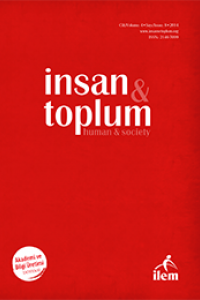Öz
Bu çalışma, Yugoslavya sosyalist rejimi içerisinde meydana gelmiş Yücel Olayı’nın Makedonya Türk toplumu üzerinde oluşturduğu toplumsal etkiler tespit edilerek göçmen Yücelcilerin Yugoslavya algılarına tanık olabilmek amacıyla gerçekleştirilmiş bir toplumsal hafıza çalışmasıdır. Söz konusu hafıza; Türkiye’ye göç eden Yücel teşkilat üyeleri ve yakın akrabaları ile gerçekleştirilen görüşmeler ile elde edilmiştir. Çalışmada ilk olarak grubun kolektif hafızasında inşa edilmiş ve aktarımı devam etmekte olan memleket- Yugoslavya algısının ve ana vatan- Türkiye algısının oluşumunda, 1953 Göçü’nün itici motivasyonlarının etkileri üzerinde durulmuştur. İkinci olarak göçmen grup tarafından anma pratiği olarak yapılandırılan törenler -mevlit törenleri- Yugoslavya algısının inşa edildiği ve aktarıldığı bir ritüel olarak ele alınmıştır. Mevlitlere dair veriler katılımlı gözlem tekniği kullanılarak elde edilmiştir. Görüşme ve gözlem verileri söylem analizine tabi tutularak grubun kolektif hafızasının yapı taşları anlamlandırılmaya çalışılmıştır. Göçmen grubun Yücel Olayı etrafında şekillenen parçalı bir kimliğe sahip olduğu düşünülmektedir. Bu parçalı kimlik unsurları memleket ve ana vatan algıları üzerine inşa edilmiş olup eski memlekete dair olumsuz algıları içermektedir.
Anahtar Kelimeler
: 1953 Göçü Toplumsal Hafıza Göç Sosyalist Yugoslavya Yücel Teşkilatı Ritüel.
Kaynakça
- Ağanoğlu, H. Y. (2012). II. Dünya Savaşı’nda Yugoslavya’da bir direniş mücadelesi: Yücel Teşkilatı. İstanbul: Rumeli Türkleri Kültür ve Dayanışma Derneği.
- Ağanoğlu, H. Y. (2013). Osmanlıdan Cumhuriyet’e Balkanların makûs talihi göç. İstanbul: İz Yayınları.
- Akkayan, T. (1976). Göç ve değişme. İstanbul: İstanbul Üniversitesi Edebiyat Fakültesi Yayınları.
- Ardıcı, M. (1991). Yücelciler 1947 Makedonya’da Müslüman direnişi: Mehmet Ardıcı’nın anıları. İstanbul: İnsan Yayınları
The Yücel Organization’s Perceptions of Yugoslavia and Turkey Following the 1953 Migration: The Notions of Home and of Fatherland
Öz
This study is a social memory project that deals with Yücelcis’ perceptions of Yugoslavia by viewing the social impacts of the Yücel Incident in Macedonian Turkish society as a movement, which emerged in socialist Yugoslavia. Interviews conducted with migrant Yücelcis in Turkey and their immediate relatives provide the basic source material for this study. First, attention is paid to the motivating influence of the 1953 migration to understand the development of the distinctive home/Yugoslavia and homeland/Turkey perceptions, which have been constructed in the collective memory of the group and persist until the present day. Secondly, memorial ceremonies (mawlids) that are occasionally organized by the migrant population are discussed as the means for the construction and circulation of their perception of Yugoslavia. Information provided about such rituals is based on the participant-observation method. The discourse analysis method is applied to the data extracted from the face-to-face interviews and observations of the mawlid rituals by which an attempt is made to delineate the main constituents (perceptions of home/Yugoslavia and homeland/Turkey) of the group’s collective memory. The paper argues that the migrant population in Turkey carries a fragmented identity that has been shaped by the Yücel Incident. This identity is based on perceptions distinguished under the meanings of home and homeland, and contains negative elements about the migrants’ previous home/Yugoslavia.
Anahtar Kelimeler
Social Memory Immigration Socialist Yugoslavia Yücel Organization Ritual.
Kaynakça
- Ağanoğlu, H. Y. (2012). II. Dünya Savaşı’nda Yugoslavya’da bir direniş mücadelesi: Yücel Teşkilatı. İstanbul: Rumeli Türkleri Kültür ve Dayanışma Derneği.
- Ağanoğlu, H. Y. (2013). Osmanlıdan Cumhuriyet’e Balkanların makûs talihi göç. İstanbul: İz Yayınları.
- Akkayan, T. (1976). Göç ve değişme. İstanbul: İstanbul Üniversitesi Edebiyat Fakültesi Yayınları.
- Ardıcı, M. (1991). Yücelciler 1947 Makedonya’da Müslüman direnişi: Mehmet Ardıcı’nın anıları. İstanbul: İnsan Yayınları
Ayrıntılar
| Birincil Dil | Türkçe |
|---|---|
| Konular | Sosyoloji |
| Bölüm | Araştırma Makaleleri |
| Yazarlar | |
| Yayımlanma Tarihi | 1 Aralık 2014 |
| Yayımlandığı Sayı | Yıl 2014 Cilt: 4 Sayı: 8 |

